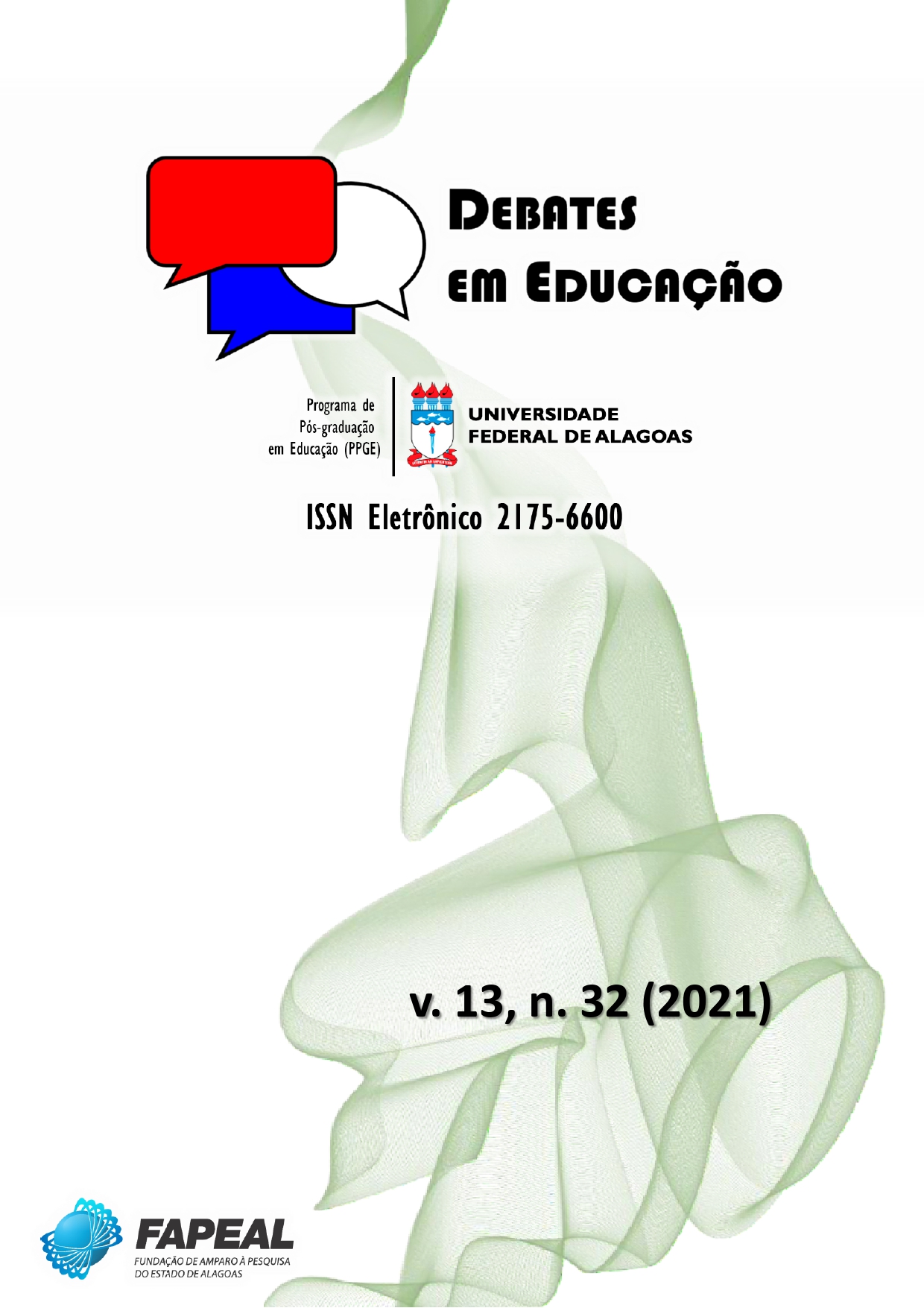Problem solving
conceptions of teachers who teach mathematics
DOI:
https://doi.org/10.28998/2175-6600.2021v13n32p242-256Keywords:
Mathematical understanding, Problem solving, Teacher education, Teaching methodology, Teaching and learningAbstract
This article aims to analyze the conceptions of Problem Solving, both in a historical context and in practices carried out by teachers who teach mathematics. It discusses the teaching approach to and through Problem Solving, guiding towards a methodological approach that involves Teaching-Learning-Evaluation. This research is qualitative in nature and is characterized as descriptive, involving the interview of 16 teachers who work from the Early Years of Elementary Education to Higher Education, being analyzed based on criteria listed from the theoretical framework. The results indicate that a teaching methodology based on Problem Solving, as a starting point for mathematical learning, is still not present in the practice of most interviewed teachers and that actions are necessary so that both, initial and continuing education, can allow that these discussions reach the classrooms.
Downloads
References
ALLEVATO, N. S. G. Associando o computador à resolução de problemas fechados: análise de uma experiência. 2005. 378 f. Tese (Doutorado em Educação Matemática) - Universidade Estadual Paulista, Rio Claro, 2005. Disponível em: https://repositorio.unesp.br/bitstream/handle/11449/102164/allevato_nsg_dr_rcla.pdf?sequence=1&isAllowed=y. Acesso em: 15 abr. 2019
ALLEVATO, N. S. G.; ONUCHIC, L. de La R. Ensino-Aprendizagem-Avaliação de Matemática: por que Através da Resolução de Problemas? In: ONUCHIC, Lourdes de La Rosa et al. (Org.). Resolução de Problemas: Teoria e Prática. Jundiaí: Paco Editorial, 2014. p. 35-52.
BERLINGHOFF, W. P.; GOUVÊA, F. Q. A matemática através dos tempos: um guia fácil e prático para professores e entusiastas. Tradução Elza Gomide e Helena Castro. 2ª ed. São Paulo: Blucher, 2008. 296 p.
BRASIL. Parâmetros Curriculares Nacionais: Matemática. Brasília: Secretaria de Educação Fundamental, 1997.
CARDOZO, D. Do átomo de carbono às grandes populações: o ensino de funções exponenciais sob a perspectiva da resolução de problemas. 2018. 158 f., il. Dissertação (Mestrado em Ensino de Ciências Naturais e Matemática) - Programa de Pós-Graduação em Ensino de Ciências Naturais e Matemática, Universidade Regional de Blumenau, Blumenau, 2018. Disponível em: http://www.bc.furb.br/docs/DS/2018/365229_1_1.pdf. Acesso em: 15 abr. 2019.
CLEMENT, L.; TERRAZZAN, E. A. Resolução de problemas de lápis e papel numa abordagem investigativa. Experiências em Ensino de Ciências, Cuiabá, v. 7, n. 2, p. 98-116, ago. 2012. Disponível em: http://if.ufmt.br/eenci/artigos/Artigo_ID185/v7_n2_a2012.pdf. Acesso em: 15 abr. 2019.
DANTE, L. R. Tudo é matemática. 1. ed. São Paulo: Ática, 2002. 332 p.
DINIZ, I. M. Resolução de Problemas e Comunicação. In: SMOLE, S. K.; DINIZ, I. M. (Org.). Ler, escrever e resolver problemas: Habilidades básicas para aprender matemática. Porto Alegre: Artmed, 2001. p. 87-97.
KAUARK, F. da S.; MANHÃES, F. C.; MEDEIROS, C. H. Metodologia da Pesquisa: Um guia prático. Itabuna: Via Litterarum, 2010. 86 p.
MENEGHELLI, J. Resolução de Problemas e o software GeoGebra: um caminho para o ensino das funções trigonométricas seno e cosseno. 2018. 165 f., il. Dissertação (Mestrado em Ensino de Ciências Naturais e Matemática) - Programa de Pós-Graduação em Ensino de Ciências Naturais e Matemática, Universidade Regional de Blumenau, Blumenau, 2018.
NCTM. An Agenda for Action. Reston, VA: National Council of Teachers of Mathematics, 1980.
NCTM. Principles and Standards for School Mathematics. Reston, VA: National Council of Teachers of Mathematics, 2000.
ONUCHIC, L. de La R. Ensino-Aprendizagem de Matemática Através da Resolução de Problemas. In: BICUDO, Maria Aparecida Viggiani (Org.). Pesquisa em Educação Matemática: Concepções e Perspectivas. São Paulo: Editora Unesp, 1999. p. 199-218.
ONUCHIC, L. de La R.; ALLEVATO, N. S. G. Novas reflexões sobre o ensino-aprendizagem de Matemática através da Resolução de Problemas. In: BICUDO, Maria Aparecida Viggiani; BORBA, Marcelo de Carvalho. Educação Matemática: pesquisa em movimento. São Paulo: Cortez, 2004. p. 213-231.
ONUCHIC, L. de La R.; ALLEVATO, N. S. G. Pesquisa em Resolução de Problemas: caminhos, avanços e novas perspectivas. Bolema, Rio Claro, v. 25, n. 41, p.73- 98, dez. 2011. Disponível em: http://www.redalyc.org/pdf/2912/291223514005.pdf. Acesso em: 16 abri. 2019.
POLYA, G. A arte de resolver problemas. 1. ed. Rio de Janeiro: Interciência, 1978.
POLYA, G. O Ensino por meio de Problemas. Revista do Professor de Matemática, São Paulo, SBM, n. 7, p. 11-16, 1985.
POSSAMAI, J. P.; CARDOZO, D.; MENEGHELLI, J. Concepções dos professores de matemática quanto a utilização de exercícios, situações contextualizadas e problemas. Amazônia: Revista de Educação em Ciências e Matemáticas, Pará, v. 14, n. 31, p. 73-87, mar-out. 2018. Disponível em: https://periodicos.ufpa.br/index.php/revistaamazonia/article/view/5701/5001. Acesso em: 15 abr. 2019.
STANIC, G. M. A.; KILPATRICK, J. Historical Perspectives on Problem Solving in the Mathematical Curriculum. In: CHARLES, R. I.; SILVER, E. A. (Eds.). The Teaching and Assessing of Mathematical Problem Solving. Reston, VA: NCTM, 1990. p. 1-22.
VAN DE WALLE, John A. Matemática no Ensino Fundamental: Formação de Professores e Aplicações em Sala de Aula. 6. ed. Porto Alegre: Artmed, 2009.
Downloads
Published
How to Cite
Issue
Section
License
Copyright (c) 2021 Debates em Educação

This work is licensed under a Creative Commons Attribution-NonCommercial-NoDerivatives 4.0 International License.
Neste tipo de licença é permitido Compartilhar (copiar e redistribuir o material em qualquer suporte ou formato) e Adaptar (remixar, transformar, e criar a partir do material). Deverá ser dado o crédito apropriado , prover um link para a licença e indicar se mudanças foram feitas . O conteúdo não pdoerá ser utilizado para fins comerciais .
Atribuição-NãoComercial 4.0 Internacional Creative Commons Attribution 4.0 (CC BY-NC 4.0).

